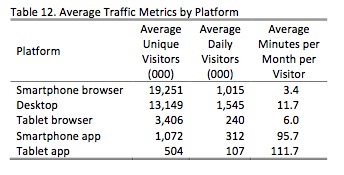Many more people consume news via browsers than via native apps — but those who do use apps spend much more time using them each month, according to a new study out today from the University of Texas’ Engaging News Project.
 The study analyzed comScore data (from September 2015) for 25 different news organizations. On average, people accessing sites via a mobile browser spent 3.4 minutes a month; via a desktop browser, 11.7 minutes a month. But people using a news organization’s mobile app, time spent soared to 95.7 minutes — and for tablet app users, a remarkable 111.7 minutes.
The study analyzed comScore data (from September 2015) for 25 different news organizations. On average, people accessing sites via a mobile browser spent 3.4 minutes a month; via a desktop browser, 11.7 minutes a month. But people using a news organization’s mobile app, time spent soared to 95.7 minutes — and for tablet app users, a remarkable 111.7 minutes.
The flip side of this, though, is that there are many fewer of those app users. The study found roughly 18 desktop browser uniques and 12 mobile browser uniques for every 1 mobile app unique. It’s only logical that people with a strong enough connection to an outlet to download and use its app are more likely to be core, repeat readers than someone who sees a stray link on Facebook. (Nearly half of American adults get news on Facebook, according to a Pew study released earlier this year, and this analysis supports the idea that many visit a news site and then return quickly back to their feeds.)
“Our analysis shows that while questions may still remain about news apps, there’s no denying that users spend a significant amount of time on them,” Engaging News Project director Talia Stroud said in a release.
That question of building loyalty gains importance as Facebook takes steps to bring more content within its walls via Instant Articles, Facebook Live, and the preference it gives its native video player.The study, meant to be a snapshot of the current digital performance of top news organizations, highlights a number of other trends in news consumption and presentation:
— More ads appear on desktop homepages than on mobile and tablet devices.
— Mobile and tablet apps are more likely to use “hamburger” navigation menus, indicated by a three-line graphic, than desktop versions.
— Apps offer a different news experience than browser-based news sites; they are more likely to give people the option to save content for later, less likely to require users to sign in, less likely to have comment sections, and less likely to include social media buttons.
— Those with low incomes and those who are Black / African-American tend to be underrepresented as news users, particularly on desktop and tablet browsers.
The full study is available here.
Leave a comment